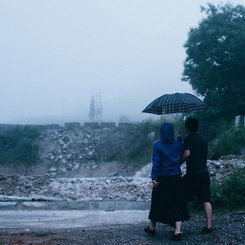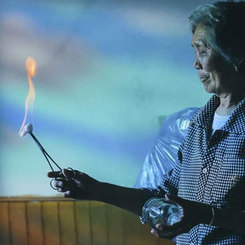Kaili Blues
Jun 23 - Jun 26, 2016
(Bi Gan, China, 2015, DCP, 113 min)
Seattle premiere!
“All memories are concealed in similar ways. Even nomads with instruments cannot express how close such gazes are to those of our ancestors.”
Visual poetry and geography guide the viewer in Bi Gan’s debut feature Kaili Blues, leading to reflections on memory, history, and dreams. Gan’s fluid camera captures the mystical landscape in the province of Guizhou, following a doctor, Chen Sheng, as he embarks on a journey by train to find his nephew, who has been abandoned by his brother. On the way to Zhenyuan, Chen Sheng came across a place called Dang Mai, where time seemed to flow both forwards and backwards, the lives of the local people a complete mystery. The personal insights gained on his journey become even more meaningful on a larger scale, as Chen’s journey ultimately reflects on the increasingly rapid pace of cultural and economic transformation in China.
Made on a tiny budget and with minimal equipment, Gan’s unpaid friends and family helped him complete the project. But this budget never hinders the film, and even enhances its power through imperfection. Gan filmed the elaborate 41-minute take three times, with three different cameras. He ultimately went with the first take, embracing its flaws, while also considering his budget and time limitations: “There’s some sense of purity in the perfectly imperfect. There’s something to be said about the aesthetics of imperfection.” Gan often experiments behind the camera, never afraid to take risks and break traditional forms.
Winner of Best Emerging Director at the Locarno Film Festival last year, Gan’s background in poetry undoubtedly leaves a unique mark on the film. Fluid camera movements conjure a dreamlike experience, allowing for the flow of time to slip away, while never losing a sense of place. At times, the camera leaves Chen to follow villagers and strangers, charting a cohesive flow of life in Guizhou. Landscape and environment are given equal significance as characters. The effect is intimate and cumulative.
“In Kaili Blues, memory is visceral, and a near-hallucination. One thing is clear: For Bi, the past serves as a kind of Proustian madeleine, and he uses geographic markers and persons as a way of calling up past events.” – Ela Bittencourt, Slant Magazine
“Bi Gan finds a majestic intimacy and wonder in stillness. The camera will often languorously pan in a room, only to settle and observe some small action (e.g. women pouring boiling tea into a small kettle), or, in the most casually surrealistic moment, a projection of an upside-down train that appears to crash through a small apartment like Lumière in miniature...Kaili Blues creates a presence that has a lifted aura of spiritualism, but it rarely draws attention to that feeling.” – Michael Snydel, The Film Stage
KAILI BLUES official trailer from Grasshopper Film on Vimeo.

